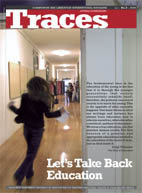
Traces N.9, October 2005
To Educate: The Greatest Risk of LifeThe word “risk” isn’t very fashionable these days, unless perhaps in terms of something to do with business or sports. And yet, for revival of various sectors of our society–from the economy to politics–many are calling for a renewed capacity for risk. Often, risk is confused with sudden adventurousness, almost a headlong rush to risk everything, regardless of the consequences, because one has nothing truly dear to affirm and defend. Instead, those who undertake an adventure, be it economic, cultural, or social, know that they do so to increase something precious to them: the well being of their family, firm, or people. Risk is a condition implicit in action, not a passing fancy. Without risks, in fact, nothing grows.
There has been a growing conviction for a few years now, among the more attentive exponents of Church life, culture, and politics, that the first emergency is education. In other words, one notes that the possible decline that touches different fields of individual, family, and social life depends on the weakness of a meaningful proposal for life. “Nothing has been proposed to these generations of men, except one thing: the utilitarian anxiety of their parents,” said Fr. Giussani. The lack of a true education, in a child or in an adult, results in a distorted, partial, utilitarian, “superficial,” almost anorexic relationship with reality. The circle of interest closes in on whatever one thinks and feels. True or false, just or unjust, good or bad, everything becomes relative, or, better, indifferent.
Education, like any undertaking, involves risk. It is always a relationship between two freedoms that put into action their desire to know and to communicate the beautiful, the true, and the good that they have discovered to take a step. The book title that Fr. Giussani, at the heart of his adventure as thinker and as man, wanted for the reflections on his experience with young people and adults was The Risk of Education. For him, a wonderful sight in the world is first of all the person who reveals what he is in the relationship with reality. Today, proposing a new examination of the book does not only mean rendering homage to a work that has historically shown its value–the fruits of the educational work brought to life by Fr. Giussani are visible and appreciated even by those who consider themselves far off, and who hold different cultural and religious positions. This proposal to reread Giussani’s work above all means taking seriously the suitableness of a method for the present. It means, in the midst of all the chatter about current events and the world’s future, throwing out the provocation of some pages that are revolutionary for the dominant way of thinking, a way of thinking that makes the lack of any bonds the law of life, that distances people from reality, and that impedes the formation of a critical judgment of events, unconditioned by preconceived ideas.
The “battle” of The Risk of Education is born of the passion and desire not to pull back from the challenge being played out in the uneasy times in which we are called to live.